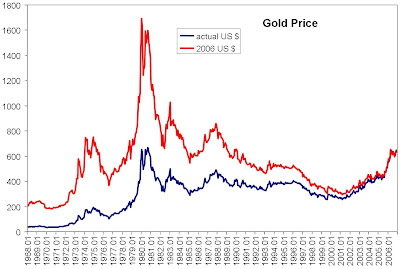 Photo from RepublicDomain
Photo from RepublicDomainIt is a common belief among Libertarians- especially proponents of Austrian economics- that a monetary system should be based on the gold-standard to protect it against inflationary measures taken by an expansive government. I happen to be among their number as a strong advocate for returning America to the gold standard and abolishing the Federal Reserve system. Yet it is important to remember that this claim and the claim that you should personally invest in gold with your individual savings are entirely different claims. While I'm not telling you not to invest in gold (in fact, I'm not going to give you any kind of investment advice, just information that you might find helpful), I do just want you to be aware that your support for a national monetary system based on gold does not necessarily require you to also believe gold is a sound personal investment (but you might end up believing that anyways for other reasons, which will depend on your personal investment strategy and tolerance for risk).
What kind of asset is gold?
Gold is a commodity. It is a fixed resource that has value because of its beauty, durability, and in part for its practical applications as a raw material. For advocates of gold investment, its stability is the primary appeal. Last week the article, Investing in Gold made its rounds on the Internet, making the case for gold by pointing out that, "Historically, the price of gold has remained stable compared to other investment vehicles that tend to fluctuate more drastically. And its value has held up even as worldwide currencies have fluctuated, due to more consistent prices and returns."
Why this is good news
This is good news because it means that even if the dollar collapses in its value (sadly not an off-the-wall or even unlikely scenario), gold is likely to remain valuable. It might even experience a temporary rise in value as an alternative, stable store of value in an unstable time. If the world is plunged into another global depression, the US dollar loses its value, and food becomes scarce, if you own gold coins, you can probably go out into the country and find a farmer who will accept those coins in order to house and feed you. In this sense, gold is stable and trustworthy as a store of value and it might be worthwhile to keep some stashed away somewhere just in case.
Why this is bad news
The very fact of gold's stable value works against it as an investment vehicle. It is not likely to give you high returns. Its dollar value does fluctuate and may rise (or may fall), but you are not likely to garner significant, long-term returns by investing in gold. While it may really come in handy after a catastrophic monetary collapse, as a commodity, gold doesn't generate actual cash flow. It is not a cash flow generating asset like stocks, bonds, or even a savings account. Your money doesn't earn interest when you turn it into gold, it just sits there and maybe grows in its dollar value. The only hope you have to get returns is to turn around and sell it to someone else when its value goes up. In this sense, it's no different than investing in baseball cards, which also do not generate cash flow, but which you might be able to sell at a higher price to a "greater fool" somewhere down the road.
Why this is misleading news
While gold is stable, once again, in the sense that it will always be valuable and that you can count on it in a way that you cannot count on national, paper currency, its value against the dollar is not necessarily stable, especially because the dollar's value isn't stable. Here's the price of gold in US Dollars from 1968 to 2006, which as you can see is pretty erratic (source):

In summary
I'm not telling you what or what not to invest in, but I do hope that this information helps fill in some gaps and tells you a little more about gold as an investment vehicle. In upcoming posts, I plan to outline and defend arguments for gold as a standard currency for the monetary system of a free country.

